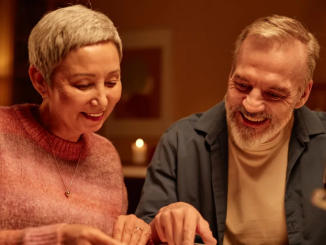
He wakes up before I do now.
Tiny bare feet padding through the kitchen, grabbing his little water bottle and the same dusty blue shirt he insists is “for work.” He won’t wear shoes unless we’re going into town, and even then it’s a debate.
He’s three. But he’s got this quiet focus that makes the animals stop and pay attention.
Yesterday I caught him trying to drag a feed bag twice his weight across the barn. The dog followed behind like it was just another morning shift.
I said, “Buddy, you don’t have to do all that,” and he looked at me like I didn’t understand the assignment.
“This is my job,” he said.
He checks on the chickens first. Then the goats. He hums when he walks, always the same off-key tune that I’m starting to recognize as the theme song from an old farming cartoon he used to watch on YouTube. The goats know him now. They nuzzle him gently, even the grumpy old one that still tries to butt me when I bring the feed.
He calls her Ma’am.
Every time he walks past her, he tips his invisible hat and says, “Mornin’, Ma’am,” like he’s in some Wild West movie. And she lets him scratch her ears. No one else gets that privilege.
When people come over, they laugh and say, “Aww, look at the little farmer!”
But to him, it’s not a game. It’s who he is.
I didn’t see it coming, honestly. I grew up in the suburbs. I didn’t know a thing about farming until I married into it. My wife’s family has had this land for three generations, and when her dad passed, it came to us. I was ready to sell it. Too much work. Too far from everything.
But she said no. She said this place was in her blood. And now, somehow, it’s in our son’s too.
It started with the chickens. He was barely walking when he first waddled out into the yard, chasing after them in diapers and rubber boots. They terrified him at first, flapping and clucking. But he’d go out every day. And after a while, they stopped running from him. He learned how to be still. How to approach without fear.
Now he walks among them like a tiny general. They move out of his way like they know who’s boss.
One morning, I woke up to find him sitting cross-legged in the dirt, hand-feeding cracked corn to a broody hen. Just sitting there, whispering to her like she was his best friend.
I took a picture. I keep it in my wallet.
We tried to give him toys, of course. Race cars, building blocks, tablets with noisy games. He’d play for a bit, then set them down and ask if he could “go check the pens.” That’s what he calls the barn now. The pens.
He has a little clipboard he carries around. No one gave it to him. He found it in the shed, wiped it clean, and declared it his.
It doesn’t have any paper. But he pretends to mark things down. “Chickens all good. Goats okay. Need more hay.”
He’s three. I still can’t believe it.
And it’s not just the chores. It’s the way he carries himself. Like he has purpose. Like he knows he’s part of something bigger.
I think about that a lot.
The other day, my wife and I were watching him from the porch. He was trying to fix a broken water bowl with a piece of duct tape and a stick. It wasn’t working, but he didn’t give up.
She turned to me and said, “He’s got his granddad’s hands.”
And he does. Same thick fingers. Same quiet way of working things out.
Her father died before our son was born. But somehow, I swear it’s like a piece of him came back through this little boy.
There’s a calmness to him that’s hard to explain.
We took him to a birthday party last month. Bouncy castle, screaming kids, cupcakes with too much frosting. He lasted fifteen minutes before he tugged on my sleeve and said, “Can we go home to the goats now?”
I laughed. But he was serious. His animals needed him. And to him, that was more important than balloons or sugar or chaos.
We left early.
On the way back, he said, “I think the brown goat is gonna have babies soon.”
I hadn’t noticed. But he was right. A week later, she gave birth to twins. He named them Buttons and Bucket.
Every morning now, he checks on them first. They follow him like shadows.
A neighbor stopped by recently. He needed help fixing his fence, and I offered to lend a hand. My son insisted on coming.
We walked across the field, and as I grabbed the toolbox, he picked up a pair of gloves twice his size and marched right behind me.
The neighbor laughed and said, “Got yourself a little foreman there, huh?”
But halfway through the job, the neighbor got stung by a bee. He’s allergic, didn’t have his EpiPen. His breathing started getting weird. I froze. Panic hit me like a brick.
And then, out of nowhere, my son said, “Mama said baking soda helps.”
He pulled out the little plastic container my wife always keeps in her kitchen bag. I didn’t even know he knew what it was for.
We mixed a paste with water and smeared it on the sting. It wasn’t a cure, but it helped.
We rushed the neighbor to the ER just in time. The doctor said we were lucky.
Later that night, I held my boy in my arms and whispered, “How’d you know that, buddy?”
He shrugged and said, “Mama told me when I got stung last week.”
Then he fell asleep with hay in his hair and dirt on his cheeks.
He’s not just pretending anymore.
And I realized something else that night.
He’s not just learning to care for animals.
He’s learning to care, period.
To notice. To act. To step in when others freeze.
There’s something powerful about that.
We had a rough winter this year. Power went out for two days, and the roads were snowed in. I was chopping firewood while my wife tried to keep the pipes from freezing.
Our son? He kept the animals calm.
He bundled up in three layers and walked from stall to stall, whispering to the goats and covering the chickens with old blankets. He even helped wrap a newborn calf in towels to keep it warm.
When the power came back and the roads cleared, I told him how proud I was.
He just nodded and said, “That’s what farmers do, Dad.”
And that’s when I stopped seeing him as a little boy playing farmer.
That’s when I started seeing him as a farmer.
Not in the legal sense, of course. But in heart. In spirit.
He doesn’t want to be a firefighter or an astronaut or a superhero.
He wants to raise animals, grow food, and mend broken things.
And honestly? The world needs more of that.
Last week, he found a baby bird that had fallen from its nest. He wrapped it in one of his socks, kept it in a shoebox by the stove, and fed it little drops of water with a spoon.
It didn’t make it.
He cried. Quiet, heavy sobs that broke me in two.
He asked if he did something wrong.
I told him no. That sometimes, no matter how much we try, things don’t go the way we hope.
He nodded, wiped his face, and said, “Okay. I’ll bury her under the apple tree.”
And he did. He dug a little hole with his red plastic shovel, said a few words I couldn’t quite hear, and covered her up with gentle hands.
Then he stood there for a long time, just watching the wind in the branches.
That’s when it hit me.
This boy—this tiny little soul with dirt under his fingernails—was already stronger, braver, and more connected than most people I’ve ever met.
A few days later, we were offered a ridiculous amount of money for our land.
A developer from the city wanted to buy it all. Said he’d build condos, a wellness retreat, maybe a golf course. Promised we’d be set for life.
My wife looked at me, unsure.
And I looked at our son, crouched in the field, teaching the baby goats how to climb on a wooden ramp he’d built from scrap wood.
He wasn’t watching us.
But I knew our answer.
We said no.
The man shook his head and muttered something about “wasting potential.”
But he doesn’t know what real potential looks like.
He didn’t see my son wake up early, feed the animals, fix a broken latch, and sit in silence beside a dying bird.
He didn’t see the way the land gives back to us, day after day, in ways money never could.
A week after we turned down the offer, something wild happened.
A woman showed up at the gate. Said she was passing through, saw our little roadside sign that read “Fresh Eggs” and stopped in.
She was older, kind eyes, soft voice. She asked if we grew anything else.
I told her not yet, but my son was hoping to plant sunflowers this spring.
Her eyes lit up.
She used to work for a nonprofit that helped turn family farms into educational centers for kids. Said there’s grants and funding available if we ever wanted to try.
I didn’t think much of it.
But she followed up. Helped us fill out forms. Wrote letters of support.
And this spring, we got approved.
Next fall, we’ll be hosting school field trips. Teaching kids about animals, planting seeds, and the beauty of simple, honest work.
My son has already picked out a name for it: “The Little Farm With Big Hearts.”
He even wants to give a tour.
He’s practicing his welcome speech. It starts with, “Hi, I’m the man of the barn.”
I don’t correct him.
Because he is.
And maybe, just maybe, he’s building something bigger than any of us imagined.
Something rooted. Something real.
Something that grows from care, not concrete.
So yeah—my son dreams of becoming a farmer.
And every single day, he’s living that dream.
If you’re reading this and wondering what the point is, here it is:
Don’t overlook the small passions. The things that seem too quiet, too simple, too early.
Sometimes the heart knows exactly where it belongs, even before we do.
Let your kids lead you back to the soil. To the rhythm of real life. To the magic of purpose.
And remember: success doesn’t always wear a suit.
Sometimes, it walks barefoot through the mud, carrying a bucket twice its size, whistling off-key, and calling goats by name.
If this story touched your heart, share it. Like it. Let someone else believe in the beauty of small dreams and tiny farmers.






Leave a Reply